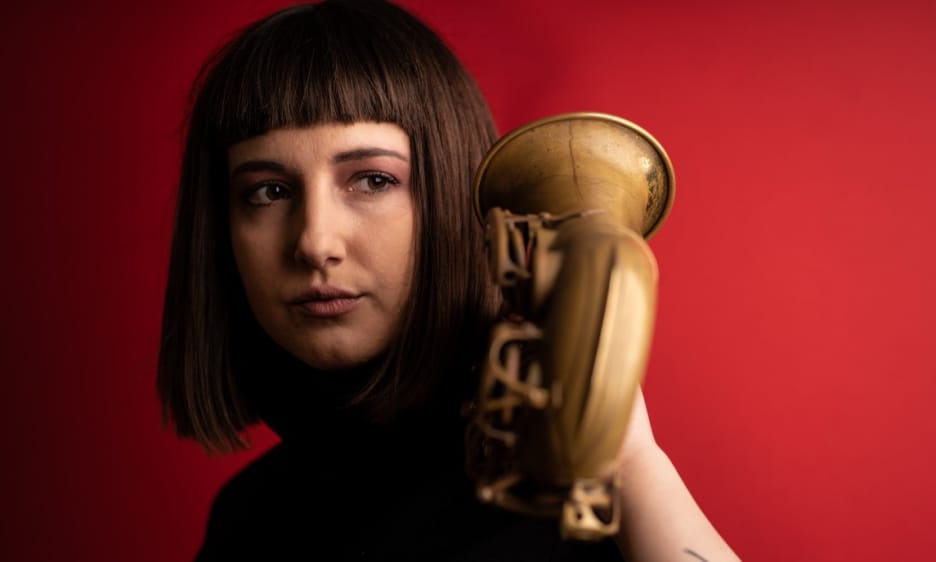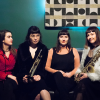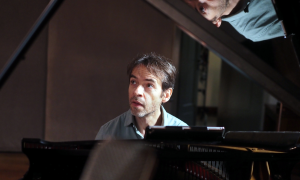Home » Jazz Articles » Interview » Carlton-Macpherson-Pass-Valenti Quartet Interview Series...
Carlton-Macpherson-Pass-Valenti Quartet Interview Series: Alana Macpherson

Courtesy Alana Macpherson
I think it is great when you bring an idea, and then other people take ownership of that idea, as well. You work on it together, and it becomes a mutual thing rather than just yours. It can develop into something so much more exciting than you could have imagined in the first place.
The first article of the series is dedicated to Alana Macpherson, Perth-native, currently pursuing her master's degree in Graz, Austria. Macpherson has been playing in various large ensembles in Australia and Europe, composing and teaching.
Macpherson started playing saxophone around the age of ten. She got her own instrument when she was eleven. Growing up, she played mostly popular music. Then, she started exploring the blues. Eventually, she got into jazz.
"I never played classical music. When I was younger, I liked Candy Dulfer and I was learning some of her solos. Then I got a boxed set of Charlie Parker and I started learning some of his solos. I guess, like every other kid, you get into jazz with Charlie Parker."
It took some time before Macpherson realized that she wanted to become a professional musician. When she finished school, she decided to study music at the West Australian Academy of Performing Arts in Perth. After graduating from the university she wanted to continue with music. Later, she made the decision to dedicate her life to music. She had some thoughts about having a different profession, but ultimately music won.
"It is not an easy life. Sometimes you have doubts, and then you come back. I have been playing music since I was tiny, always singing or playing music with my family. My dad was a musician. There was nothing else that I wanted to do. I thought of becoming a lawyer because I was and still am passionate about justice and human rights. But music was the thing."
Macpherson is primarily a performer, but she also composes and teaches a lot. Aside from music teaching, she works teaching English as a native speaker around Austria.
Among the mentors who helped her to become a professional musician, Macpherson names Mace Francis, a composer from Perth. As a young person, she was playing in the West Australian Youth Jazz Orchestra with him as the conductor. He was one of the people who encouraged her to continue with music and push forward. He taught her composition and had a big influence on her overall.
Another mentor of hers has been Edward Partyka. She discovered his music when he came to Perth. He had a big influence on her music, and he was the primary reason that Macpherson went to study in Graz. She also names Jamie Oehlers, her teacher in Perth, thanks to whom she decided to pursue music and who had a huge influence on her style of playing. Yet, Macpherson says she would not have become a professional musician without the support of Kate Pass and Talya Valenti.
"We studied together, supported each other and helped each other through the study and the time after. If it was not for them, I do not think I would be still doing this. It got really hard for a few years. But they were always so supportive."
Macpherson enjoys listening to a variety of music and it is hard for her to pick one favorite album. She has been listening to Tineke Postma and is inspired by her. She has a wide variety of influences including John Coltrane, Ornette Coleman, Keith Jarrett, Kenny Garrett, Cannonball Adderley, Joe Henderson, Django Bates, and latterly, Petter Eldh and Jim Black.
Jazz in Australia vs Abroad
In 2018, Macpherson decided to move to Austria. She had a feeling that she wanted to grow musically, hear more sounds and meet more people."Perth is beautiful, and there are amazing musicians, but there are not many people coming in and out of the city. It is one of the most isolated cities in the world. You have to take a plane for several hours to reach another city. Touring is impossible. I wanted to hear new sounds, meet new musicians and discover other music. So, I applied for the master's program here at the Kunstuniversität Graz. Then, I quit all my jobs and moved here. It has been great. It has been the best thing I have ever done."
With her move to Austria, Macpherson had to learn German. In Graz, she enjoys meeting many players from different parts of the world. She says that she understands many more cultures in a better way now. She also likes being exposed to new music and different traditions and being inspired by all the players around her.
"I moved here because I knew that I wanted to study with Ed Partyka. He is an American composer, and he teaches here. I started with him, and now I am studying with Julian Arguelles, who I also wanted to study with. He is a British saxophonist, and he played with Kenny Wheeler. He is an amazing player whom I have been listening to for years, and he is an amazing teacher. I came to Graz because it is kind of a big band city. It has great players and there was also a connection with Perth. I knew some of the people who were lecturing and who are professors here. So I decided to move here to study."
After graduation, Macpherson is planning to stay in Europe. She is applying for several doctoral programs. Someday, she hopes to have the Carlton-Macpherson-Pass-Valenti quartet reunion, either in Austria or Australia.
"I would love to bring the band here. It is a question of finding the right place to play and a funding body to pay for those airfares. So, I would love to play again, but it is not easy. I am not sure when we will play again."
Comparing the jazz scene in Australia and in Europe, Macpherson finds the scene in Europe much more connected and better funded in general. It also seems to have larger audiences for the music, she notes.
"You think back to Mozart and all these people that have come from Austria. There is this huge tradition of hundreds of years of appreciating and loving music. So every concert I go to, there is a big audience that is so engaged and loves the music, which is really refreshing to see."
At the same time, she says that Australia is changing and growing all the time. Perth is getting bigger as more people move there. After the first lockdown, more people came to concerts than ever before, because they had been through a lockdown and were hungry for live music.
"It is different here, and it is definitely easier to do things like a tour. In 30 minutes, I am in Slovenia. In a couple of hours, I am in Croatia. It is definitely easier to play in other places and move around. In Perth, you would have to drive for two days."
Collaborations
Before the quartet with Carlton, Pass and Valenti, Macpherson had several of her own projects. She had a nonet in Perth, which featured her on alto saxophone, Dylan Hooper on tenor saxophone, Jessica Beahan on bass clarinet, Ricki Malet on trumpet, Blake Philips on trombone, Jacob Mitchell on guitar, Austin Salisbury on piano, Kate Pass on bass, Alex Reid on drums and Priscilla Gardner on vocals. They recorded an album, All or Nothing At All (Self-published, 2018).In addition to the nonet, Macpherson had a quartet in Perth. She also played with many people coming through the city. She was doing a lot of big band music before, but once she moved to Graz, she started playing even more big band music. She toured with the pianist Emil Spányi through Switzerland, Germany and Austria. She also writes music for large ensembles.
"I am writing for a small big band that has three trumpets, two trombones, a French horn, three reeds and a rhythm section. I am researching the meeting places of composed and improvised ideas in a large ensemble. Some of the music is composed, and some of it is totally free. Some of it we are composing together, some of it is partly composed, partly free. It is an exploration of how I can make a more improvised large ensemble. I play a lot of big band music, where you sit there and you're almost a jazz machine. So I am trying to create a collaborative large ensemble here, and this is the place to do it. The players here are great. There is this insane Austrian brass tradition. Same in Slovenia, and Croatia: lots of people play brass instruments at such a high level. We just do not have it in Australia. We do not have this brass band tradition. So, the big bands here are amazing. I am making the most of that and also trying to find some new, meaningful place for an improvising large ensemble."
Some people in Macpherson's large ensemble are from the university. Some live in Vienna and come to Graz for rehearsals. This large ensemble has been a part of her master's project, but she plans to continue it after graduation and release an album in 2023.
Macpherson enjoys bringing unfinished ideas to a band and to let the ideas be changed and taken over by other people's thoughts. She always allows other people to have an input and is able to let go of what she might have initially imagined.
"Allowing other people to work with your ideas is a great starting place for collaboration, I think. It is not always easy. Sometimes, you have a strong vision. But I think it is great when you bring an idea, and then other people take ownership of that idea, as well. You work on it together, and it becomes a mutual thing rather than just yours. It can develop into something so much more exciting than you could have imagined in the first place. Of course, listening to other people is important, giving space for other people's ideas and thoughts, leaving space for other people to contribute. That is something I had to learn."
Recording projects
Among the highlights of her recordings, Macpherson mentions her two albums. On each album, she played free, recorded two takes of the free tracks and then just picked one. She enjoyed this process and is planning to continue using it on her next album, as it gives her the freedom of seeing what happens in the moment."I find recordings challenging in general. I get nervous because of this idea that it is going to be there forever. One of the reasons I play improvised music is because it is going in the moment. So I find recordings intimidating."
One of the challenges in the recording of the Carlton-Macpherson-Pass-Valenti quartet was the lockdown in Perth. They had to reschedule the recording and were not sure if it was going to happen at all because Macpherson was supposed to travel back to Graz. Another challenge has been funding of the recordings. Most of the recordings that Macpherson did were self-funded. While in Graz, she was able to use the recording studio at the university. The studio is cheap because it is a part of the university, but there are still a lot of items to fund in the recording of her large ensemble.
Macpherson says that people have been generous with their time, but that she is on the lookout for grants to pay her musicians. A lot of grants in Austria require an application in German, so that creates another challenge for her. She has German at a good conversational level, but writing applications requires better language skills and some outside help. Still, she was able to make the recording of her large ensemble happen at the end of December, to be released in 2023.
Undeniable
Although Macpherson, Pass and Valenti knew each other for a long time from the university, they had not played together until Macpherson came to Australia from Graz during the pandemic. Carlton became the fourth member of the quartet. Macpherson met her back in 2014 at the jazz festival in Melbourne."We played at the jam session, and we got along. We ended up hanging out that week and played a lot. Then, she moved to Perth when I moved to Graz. We did not cross paths until I came back."
While Macpherson was in Perth, she suggested to Carlton, Pass and Valenti to make an album. They started writing music, working on it together and making the album Undeniable.
"We got together and brought some tunes that we have written already and went through what we liked. Then, we started writing new things. We were working with each other's ideas."
Macpherson applied for a grant to get the funding for the recording. It turned out that she was not eligible to apply because she had not been in Australia for more than twelve months. Valenti had to finish the application process. That grant application went well, and the recording of Undeniable was funded.
"Same Place Same Time," "Prelude," "Walyunga Part 1" and "Walyunga Part 2" are the tracks that Macpherson composed on Undeniable. The last two-part composition is dedicated to the experience of her walking with Valenti in the bushland of the Walyunga National Park. "Same Place Same Time" was written right before Macpherson came to Perth during the lockdown.
Macpherson says that she wants the listeners of Undeniable to hear what music from Perth and Australia sounds like. As a percussion instrument, Valenti used the seed pods of a native Australian tree on the album to capture the sounds of the Australian landscape. Macpherson says that she would love people to imagine how the bushland feels. Although the quartet does not have any plans to play together while she is in Graz, she would love to organize some other project together as she is happy with how Undeniable turned out.
Tags
Interview
Carlton Macpherson Pass Valenti
Jane Kozhevnikova
Candy Dulfer
Charlie Parker
Mace Francis
Ed Partyka
Jamie Oehlers
Tineke Postma
John Coltrane
Ornette Coleman
Keith Jarrett
Kenny Garrett
Cannonball Adderley
Joe Henderson
Django Bates
Petter Eldh
Jim Black
Julian Arguelles
Dylan Hooper
Jessica Beahan
Ricki Malet
Blake Philips
Jacob Mitchell
Austin Salisbury
Alex Reid
Priscilla Gardner
Emil Spányi
About Carlton Macpherson Pass Valenti
Instrument: Saxophone
PREVIOUS / NEXT
Support All About Jazz
 All About Jazz has been a pillar of jazz since 1995, championing it as an art form and, more importantly, supporting the musicians who make it. Our enduring commitment has made "AAJ" one of the most culturally important websites of its kind, read by hundreds of thousands of fans, musicians and industry figures every month.
All About Jazz has been a pillar of jazz since 1995, championing it as an art form and, more importantly, supporting the musicians who make it. Our enduring commitment has made "AAJ" one of the most culturally important websites of its kind, read by hundreds of thousands of fans, musicians and industry figures every month.























